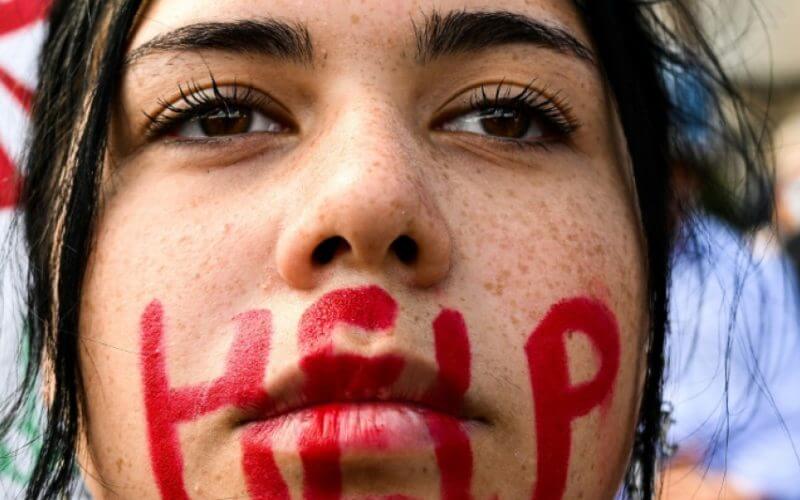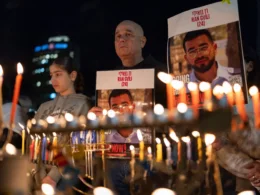Following weekend calls for nationwide student protests in Iran over the death of 22-year-old Mahsa Amini, a number of Iranian university and high school students across the country held large protest rallies, calling for the downfall of the Islamic and an end to Islamic rule. The latest development comes as the Islamic Republic has vowed to crush the protesters, continuing to send security forces and the Basij police to quell protests throughout the country.
According to reports, Iranian college students from Mashad’s Ferdowsi University held large outside rallies, chanting anti-regime slogans like "Referendum, Referendum, this is People's Slogan" and "Down with Khamenei."
Young Iranian women at the rallies took off their hijabs and waved them in the air, receiving loud praise from their male counterparts.
In Karaj, west of Tehran, a group of young Iranian schoolgirls held protests loudly chanting "Death to the Dictator" and "Women, Life Liberty," taking off their hijabs and waving them in the air.
In places like Kurdistan, high school students in the hometown of Mahsa Amini took to the streets to protest the regime, ripping up and burning hijabs while tearing pictures of former Iranian Supreme Leader Ayatollah Ruhollah Khomeini and current Supreme Leader Ali Khamenei.
On social media, videos showed highschool girls in Gohardasht confronting and kicking the general director of education out of the school building.
"University students once again prove that they are a critically significant socio-political force in Iran's history. But strikes across educational institutions must cascade across several key sectors to threaten the regime," said Behnam Ben Taleblu, senior fellow on Iranian security and political issues at the Foundation for Defense of Democracies (FDD).
At these rallies, students stated that their movement was not a protest but a "revolution" against the Islamic regime, calling for nationwide marches and a takeover of the streets.
"If street power is sustained and merged with strike power, that could trigger a repeat of the domestic conditions that boxed in the monarchy in the late 1970s in Iran," explained Taleblu.
According to reports, many students engaged in these protests have faced threats on their lives and arrests from students loyal to the regime and university officials.
While many students have taken to the streets and marched outside of schools chanting in unison against the regime, security forces have ratcheted up their crackdowns, bringing Basij police to arrest, beat, and kill young civilians.
"Unfortunately, the regime has a long history of cracking down on student organizations, movements, and protests using vigilante, paramilitary, and various police force branches. Iranian students have been through everything from kangaroo show trials to mass arrests to disappearances, torture, false confessions, and worse," said Taleblu.
While some experts compare the student protests in Iran to the ones that occurred in 1999 and 2009, others like Taleblu explain that unlike student-led movements in 1999, "student political activity in favor of the protests seen across Iran from 2017 to the present is qualitatively different. No longer are students pushing for reform. They, like their brave compatriots on the streets, seek revolution."
With the internet shutdown in Iran and citizens unable to contact their relatives abroad, many Iranian Americans have also protested in solidarity with Iranians in Iran, calling for regime change in the country and on the Biden administration to do more than issue statements of condemnation.
Many Iranian Americans have called on the administration to stop negotiations with Iranian officials over reviving the 2015 nuclear program, which would result in economic relief for the mullahs and help its military forces crackdown against protesters.
Taleblu, like many other experts on Iran, argues that "Washington and many Western capitals have much catching up to do when it comes to merging their rhetoric and their actions when it comes to standing with the Iranian people. Increasing the pressure on the regime through sanctions enforcement, designations, and naming and shaming rights violators at the national and local levels is just step one. But all of this would be undone by seeking a nuclear deal like the JCPOA which would enrich the worst of the worst in the Islamic Republic."









